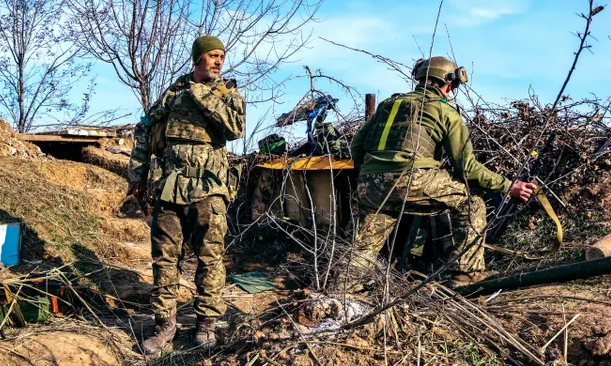Russia-Ukraine war at a glance: what we know on day 396 of the invasion

By The Guardian - Jane Clinton and agencies - Sun 26 Mar 2023
Kyiv has said Russia was holding Minsk as a “nuclear hostage” after Vladimir Putin announced the deployment of tactical nuclear weapons to ally Belarus
- Nato has criticised Russia for its “dangerous and irresponsible” nuclear rhetoric, a day after President Vladimir Putin said Russia would station tactical nuclear weapons in Belarus, Reuters reports.
- Kyiv has said Russia was holding Minsk as a “nuclear hostage” after Vladimir Putin announced the deployment of tactical nuclear weapons to ally Belarus, Agence France-Presse reports.
- Ukraine has called for an emergency meeting of the United Nations security council over Russia’s announcement.
- Ukrainian refugees are increasingly being targeted for sexual exploitation with an increase in interest in pornography claiming to feature refugees from the war-torn country, according to research by Thomson Reuters.
- Ukrainian presidential aide Mykhaylo Podolyak has accused Vladimir Putin of violating the nuclear non-proliferation treaty and resorting to “scare” tactics.
- Russia and China are not creating a military alliance, the Russian president said in a televised interview broadcast on Sunday, stating that the two countries' military cooperation was transparent, news agencies reported.
- The UK Ministry of Defence says that since the start of March 2023, Russia is likely to have launched at least 71 Iranian-designed Shahid series one-way attack uncrewed aerial vehicles (OWA-UAVS) against targets across Ukraine. It says Russia is likely launching Shaheds from two axes: from Russia’s Krasnodar Krai in the east and from Bryansk Oblast in the northeast.
- Ukraine will no longer resort to “dangerous” monetary financing to fund the war against Russia, its central bank governor, Andriy Pyshnyi, told the Financial Times in an interview published on Sunday.
- Ukraine’s deputy minister of defence Hanna Maliar went on Facebook to urge Ukrainians to not openly discuss details about the country’s upcoming offensive. “On live broadcasts, don’t ask experts questions [in the vein of] ‘how is the counter-offensive going?’, don’t write blogs or posts on this topic, and don’t discuss military plans of our army publicly at all. We have one strategic plan – to liberate all our territories. And as for the details – that’s simply a military secret,” Maliar wrote.
- The head of the UN’s International Atomic Energy Agency will visit Ukraine’s Zaporizhzhia nuclear power plant next week to assess the serious security situation there, the IAEA said. Rafael Grossi said in a statement that the nuclear safety and security dangers at the Russian-held plant were “all too obvious”.
- Russia fired on a humanitarian aid delivery point in the city of Kherson on Saturday, injuring two civilians, according to the Ukrainian military. Oleksandr Prokudin, head of the Kherson regional military administration, said: “Russian occupiers continue shelling the places where civilians are provided with aid.”
- The leading commander of Ukraine’s military has said his forces are pushing back against Russian troops in the long and grinding battle for the town of Bakhmut. Separately, Britain’s defence ministry said the months-long Russian assault on the city had stalled, mainly as a result of heavy troop losses. British military intelligence also said Russia appeared to be moving to a defensive strategy in eastern Ukraine, Associated Press reported.
- Russian oil company Gazprom reduced gas exports to the EU through Ukraine by 15%, the Kyiv Independent reports. On 24 March, Gazprom recorded a gas transit flow of 42.5m cubic metres. A day later, the volume decreased to 36.2m cubic metres.
- The US president, Joe Biden, and the Canadian prime minister, Justin Trudeau, have displayed a united front against authoritarian regimes as Biden visited the Canadian capital days after the leaders of China and Russia held a Moscow summit. Reuters reported that images of Biden and Trudeau standing side by side in Ottawa on Friday announcing agreements including on semiconductors and migration represented a counterpoint to the scene in Moscow days ago.
- The Turkish president, Recep Tayyip Erdoğan, spoke by phone with Putin and thanked him for his “positive attitude” in extending the Black Sea grain deal, the Turkish presidency said on Saturday. It said the two leaders discussed steps to improve Turkish-Russian relations, and developments regarding the war in Ukraine, and that Erdoğan expressed the importance of ending the conflict through negotiations as soon as possible, Reuters reported.

